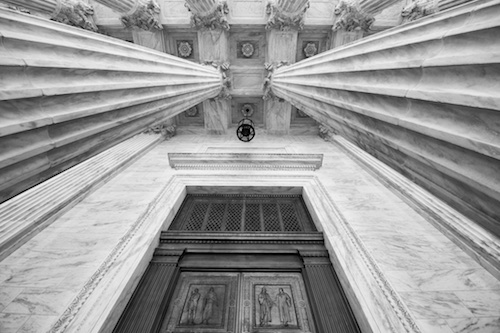”The case raises the question of whether the Federal Circuit can refuse to hear an appeal by a non-defendant petitioner from an adverse final written decision in an inter partes review proceeding on the basis of a lack of a patent-inflicted injury-in-fact, even though Congress has statutorily created the right for “dissatisfied” parties to appeal to the Federal Circuit.”
 On January 11th, Askeladden LLC (Askeladden) filed an amicus brief in support of the Supreme Court accepting certiorari from JTEKT Corp. v. GKN Automotive Ltd., No. 2017-1828 (Fed. Cir. 2018). This case raises the important question of whether the U.S. Court of Appeals for the Federal Circuit can refuse to hear an appeal by a non-defendant petitioner from an adverse final written decision in an inter partes review (IPR) proceeding on the basis of a lack of a patent-inflicted injury-in-fact, even though Congress has statutorily created the right for “dissatisfied” parties to appeal to the Federal Circuit. 35 U.S.C. § 319.
On January 11th, Askeladden LLC (Askeladden) filed an amicus brief in support of the Supreme Court accepting certiorari from JTEKT Corp. v. GKN Automotive Ltd., No. 2017-1828 (Fed. Cir. 2018). This case raises the important question of whether the U.S. Court of Appeals for the Federal Circuit can refuse to hear an appeal by a non-defendant petitioner from an adverse final written decision in an inter partes review (IPR) proceeding on the basis of a lack of a patent-inflicted injury-in-fact, even though Congress has statutorily created the right for “dissatisfied” parties to appeal to the Federal Circuit. 35 U.S.C. § 319.
In the proceedings below, JTEKT filed a petition requesting IPR pursuant to the relevant statutory scheme devised by Congress in the America Invents Act, 35 U.S.C. §§ 311-319. The Patent Trial and Appeal Board (PTAB) later issued a final written decision holding the challenged claims of the patent not unpatentable.
JTEKT then filed to appeal the PTAB’s decision to the Federal Circuit, to which GKN Ltd. (GKN) moved to dismiss the appeal for lack of Article III standing. JTEKT had the burden to demonstrate some injury resulting from the PTAB’s decision. JTEKT submitted two declarations in support of its standing. Although JTEKT couldn’t definitively say whether it would infringe the patent, JTEKT argued that the general features were similar and the “patent posed a risk to future development.” JTEKT Corp. v. GKN Auto. Ltd., 898 F.3d 1217, 1221 (Fed. Cir. 2018).
Ultimately, the panel held that JTEKT failed to establish an actual injury sufficient to confer Article III standing because “the[] declarations [did] not establish that [JTEKT’s] planned product would create a substantial risk of infringing [the] patent or likely lead to charges of infringement[.]” Id. Further, the panel did not agree with JTEKT’s argument that the “creation of estoppel based on [JTEKT’s] participation in the IPR constitute[d] a separate, and independent, injury[.]” Id. Therefore, the appeal was dismissed.
The following excerpt from the brief summarizes the arguments presented by Askeladden in support of JTEKT’s petition:
Askeladden submits this amicus brief in support of JTEKT’s Petition for a Writ of Certiorari being granted, along with the currently pending RPX Cert. (No. 17-1686). The issue raised is whether meeting the statutory requirements of Section 319 of Title 35 of the United States Code is an intangible injury-in-fact that is enough to meet the “case or controversy” requirements of Article III of the U.S. Constitution.
While Askeladden offers no opinions on the ultimate merits of JTEKT’s underlying IPR petition, it supports JTEKT’s right as a “dissatisfied” party to the IPR proceeding to appeal the adverse decision by the Patent Trial and Appeal Board (“PTAB”). That decision denied JTEKT the Congressionally authorized relief it requested from the Government, namely, the cancellation of patent claims. JTEKT was denied the opportunity to argue the merits of its appeal by the Court of Appeals for the Federal Circuit (“Federal Circuit”), which held that JTEKT lacked sufficient injury-in-fact for standing to pursue its appeal. (Appendix to Pet. (“App.”) 1a-8a).
I. JTEKT was authorized by Congress to petition the Government (via the PTAB) for relief (cancellation of patent claims) in the IPR proceeding below and, as a dissatisfied party, to appeal an adverse final written decision denying the requested relief.
A. JTEKT filed a petition requesting IPR of claims 1-7 of U.S. Patent No. 8,215,440 (“the ‘440 patent”) pursuant to the statutory scheme devised by Congress in the Leahy-Smith America Invents Act, Pub. L. No. 112-29, 125 Stat. 284 (2011) (“AIA”), codified in part in 35 U.S.C. §§311–319 and corresponding regulations 37 C.F.R. §42.100 et seq. (App. 10a). The PTAB instituted an IPR of the challenged claims (id.), and ultimately entered a final written decision holding that some of the challenged claims (2-3) are not unpatentable (App. 9a-56a; see also App. 2a-3a)
B. Thereafter, JTEKT, as a “dissatisfied party” under 35 U.S.C. §319, timely appealed to the Federal Circuit. At the request of Patent owner GKN Automotive, Ltd. (“GKN”), the Federal Circuit dismissed the appeal “[b]ecause JTEKT lacks standing to appeal.” (App. 2a). The Federal Circuit thereafter summarily denied JTEKT’s petition for panel hearing and rehearing en banc. (App. 58). Askeladden submitted an amicus brief in support of rehearing below. (CAFC No. 17-1828, ECF No. 63).
On December 7, 2018, JTEKT filed this Petition for a Writ of Certiorari.
II. The Federal Circuit’s decision below dismissing JTEKT’s appeal for lack of standing is the latest in its growing line of decisions (App. 4a-5a) that (i) conflict with this Court’s precedent (compare App. 5a-6a, with Section II infra), (ii) ignores Congressional intent and (iii) ignores the statutory penalties imposed on JTEKT as an unsuccessful petitioner who is “dissatisfied” (35 U.S.C. §§315(e), 319).
A. Led into error by earlier erroneous decisions in Consumer Watchdog v. Wis. Alumni Research Found., 753 F.3d 1258 (Fed. Cir. 2014), and Phigenix, Inc. v. Immunogen, Inc., 845 F.3d 1168 (Fed. Cir. 2017), the panel below created an artificial and myopic “injury-in-fact” test that limits standing to when there is an imminent risk of “a possible infringement suit.” (App. 4a-5a). Like the earlier decisions (and the decision in the RPX Cert.), the panel ignored Congress’ definition in 35 U.S.C. §319 of an “injury-in-fact,” namely, an IPR petitioner’s “dissatisfaction” with the Government’s (PTAB) presumably improper denial of the relief sought (cancellation of patent claims). (Cf. App. 4a-5a, 8a).
As this Court recently explained:
A party dissatisfied with the Board’s decision can seek judicial review in the Court of Appeals for the Federal Circuit. §319. Any party to the inter partes review can be a party in the Federal Circuit. Ibid.
Oil States Energy Servs., LLC v. Greene’s Energy Grp., LLC, 138 S. Ct. 1365, 1372 (2018).
Although “‘Congress cannot erase the Article III’s standing requirements by statutorily granting the right to sue to a plaintiff who would not otherwise have standing,’” nonetheless, “[i]n determining whether an intangible harm constitutes injury in fact, both history and the judgment of Congress play important roles.” Spokeo, Inc. v. Robins, 136 S. Ct. 1540, 1547-49 (2016) (citation omitted).
Thus, Congress may identify intangible harms that meet minimum Article III requirements, and may even “‘elevat[e] to the status of legally cognizable injuries concrete, de facto injuries that were previously inadequate in law.’” Id. at 1549 (quoting Lujan v. Defenders of Wildlife, 504 U.S. 555, 578 (1992)).
That is what Congress has done here. It has defined a party’s “dissatisfaction” with an adverse final written decision in an IPR as a sufficient intangible injury that confers standing on that party to appeal.
B. Further, the Federal Circuit’s decision is in conflict with this Court’s prior decisions that uphold Congress’ authority to enact statutes creating legal rights, and confirm that invasion of these statutory rights can confer Article III standing even though no injury would exist absent the statute. The Court’s other concerns in Lujan and Spokeo are also met because Sections 141(c) and 319 limit the right to appeal to a “party” to the IPR proceeding, and to the “decision.” Unlike other cases, the dispute here is not political.
The Federal Circuit decisions also conflict with authority of by the Court of Appeals for the D.C. Circuit (“D.C. Circuit”). This Court’s intervention is necessary to address this circuit split.
C. The Federal Circuit’s jurisprudence is also contrary to the legislative intent, in which Congress ensured appellate rights to all parties to an IPR. See 35 U.S.C. §319.
D. Separately, the PTAB’s finding that claims of the ‘440 Patent are not unpatentable invokes statutory estoppel against JTEKT under 35 U.S.C. §315(e). This estoppel is a real injury that “supplie[s] the personal stake in the appeal required by Art. III.” Compare Deposit Guar. Nat’l Bank v. Roper, 445 U.S. 326, 337 (1980), with App. 8a.
III. This issue, which is also raised in the RPX Cert. case, is ripe for decision by this Court.
A. This issue is important to preserve the appellate protection that this Court found is crucial to the constitutionality of IPR proceedings.
B. The Federal Circuit has established its view on this subject, and consistently follows its prior erroneous line of cases.
Accordingly, Askeladden urges this Court to take JTEKT’s Petition, together with the RPX Cert. (No. 17-1686) and determine whether 35 U.S.C. §319 provides a sufficient constitutional basis to allow any dissatisfied petitioner in an IPR to appeal an adverse final written decision to the Federal Circuit.
Image Source Deposit Photos
Image ID: 133300380
Copyright: renaschild

![[IPWatchdog Logo]](https://ipwatchdog.com/wp-content/themes/IPWatchdog%20-%202023/assets/images/temp/logo-small@2x.png)




![[Advertisement]](https://ipwatchdog.com/wp-content/uploads/2024/04/UnitedLex-May-2-2024-sidebar-700x500-1.jpg)
![[Advertisement]](https://ipwatchdog.com/wp-content/uploads/2024/05/Quartz-IP-May-9-2024-sidebar-700x500-1.jpg)
![[Advertisement]](https://ipwatchdog.com/wp-content/uploads/2024/04/Patent-Litigation-Masters-2024-sidebar-700x500-1.jpg)

![[Advertisement]](https://ipwatchdog.com/wp-content/uploads/2021/12/WEBINAR-336-x-280-px.png)
![[Advertisement]](https://ipwatchdog.com/wp-content/uploads/2021/12/2021-Patent-Practice-on-Demand-recorded-Feb-2021-336-x-280.jpg)
![[Advertisement]](https://ipwatchdog.com/wp-content/uploads/2021/12/Ad-4-The-Invent-Patent-System™.png)







Join the Discussion
4 comments so far.
Anon
February 8, 2019 03:35 pmPro Say,
Your post — while not on point vis a vis standing — IS reflected in a recent case (the link escapes me at the moment) that DOES indicate that even a successful IPR (with patent defeated in that forum) CANNOT be used in an Article III Court because of how the AIA was written that applies estoppel no matter the outcome at the PTAB.
This at least is the position in an invited brief from the offices of Director Iancu.
I think I saw this on Law360 (Appeal from the United States District Court for the District of New Jersey in No. 2:16-cv-02449-KM-JBC, Judge Kevin McNulty), but have not seen it on any of the blogs…
Pro Say
January 15, 2019 09:01 pmAnon & anon2#
Big. Plus. Ones.
Youz choose to swim in the IPR (blood bath), and youz lose … no soup (Article III Court) for you.
anon2#
January 15, 2019 11:05 amFirst of all, congratulations to the site moderator on providing a platform to a variety of opposite opinions, so that even the seemingly most abstruse ones may be voiced in this forum.
I have the advantage of not being a practitioner, only a mere inventor to whom patents have been granted, so some of the intricacies of may be lost on me, but not the logic of what Congress intended as the conditions for institution of an IPR.
For, if the party which is successful in their petition to have an iPR instituted, but where the PTAB subsequently upholds the patent, can nevertheless appeal the decision at the Federal Circuit, there is no meaning to the estoppel.
The plaintiffs’ argument in seeking certiorari on this point is clearly disingenuous:if there is to be no estoppel on the issues previously raised unsuccessfully at the PTAB, on the grounds that the petitioner has thus suffered an injury through being estopped on using these same arguments in future proceedings, what possible downside is there for the petitioner (whether an “interested party” or not) not to institute an IPR in the first place?
Heads” I win, (the PTAB decides the claims are unpatentable), “Tails” I lose, but not really, since I can appeal whether I should be estopped from using these same arguments when the patent infringement case ACTUALLY gets litigated.
In a way, it would almost be a good thing if the certiorari actually got accepted and the case was heard. If the petitioner won, it might actually finally reveal the whole illogical nature of the IPR process, where a patent which has already been examined by the PTO can then be reexamined ad infinitum until the “right” decision is arrived at.
Anon
January 15, 2019 08:40 amSaw the headline, considered the source, and frankly, stopped reading at that point.
This is from the same group that previously did not account for the plain fact that what is being attempted is an illicit bootstrapping of parties without Article III standing to get into the Article III forum.
Congress purposefully set up a dual forum system. The plain fact remains that that mechanism cannot abbrogate the separation of powers that exists between the fora.
Perhaps I will circle back to see if the authors have made advance in incorporating this concept into their attempts to encourage the bootstrapping.